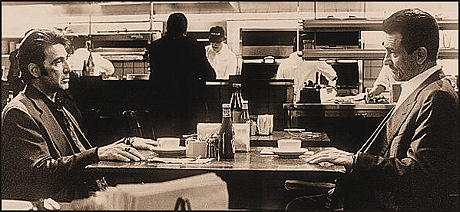So there’s a mild story-telling phenomenon afoot these days: movies about two strong assertive alpha males who never meet during the course of the film until the very end, which a friend feels amounts to a kind of cheat. I think parallel-fate stories are interesting as hell, but I know what thsi guy means. You see two tough male leads on the poster and you figure, okay, these guys are going to mix it up on some level. And then they don’t.

The worst case, he feels, was War, the Jason Statham/Jet Li flick “that marketed itself as a big action movie pitting them, when in fact they were only screen together for about 10 minutes and fighting for about five.
“American Gangster is like that too, cutting back and forth between Russell Crowe and Denzel Washington and only putting them face to face at the very end.
“By its nature, The Departed was like that, too, where we never saw Matt Damon and Leonardo DiCaprio on screen together except for that chase sequence in Boston’s North End.
Reservation Road is another example, he feels. “Joaquin Pheonix and Mark Ruffalo meet a couple of times, but they only really come together at the end for that memorable scene.
“I realize that the film is assembled like the book (which has one chapter called ‘Ethan’ and the next called ‘Dwight’) but I wonder if this is something that’s being done to help with budget since you only need the big stars for half the scenes you would normally (i.e., 3 weeks rather than 6 weeks) with little overlap?”
“Can you think of any other movies recently or in the past that followed this trend?”
Yeah, but an excellent one — Michael Mann‘s Heat. Robert De Niro and Al Pacino spoke to each other in just one scene (i.e., the face-to-face over coffee at Kate Mantilini) but is was as good as mano e mano dialogue scenes get, and it was all the movie needed. Note: They also speak to each other in the final scene, of course, but barely. De Niro: “Told you I wasn’t going back [to jail].” Pacino: “Yeah.”
Pete Hammond reminded me that Sidney Poitier and Anne Bancroft never meet at all in a 1965 drama called A Slender Thread — about Poitier trying to talk Bancroft out of committing suicide. And of course, Claude Lelouch used parallel stories (i.e., the lovers never meeting until the end) in in at least two of films — And Now, Ladies and Gentleman and (as I recall) Another Man, Another Chance.
I can’t think of any others, although I’m sure they’re numerous.
